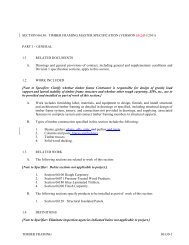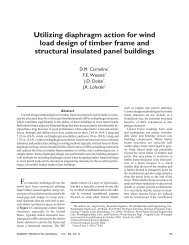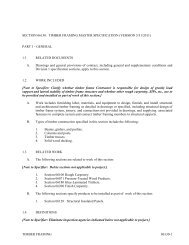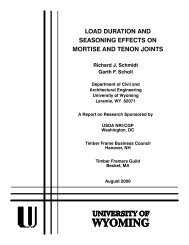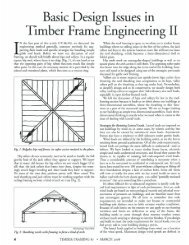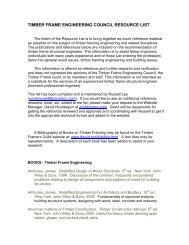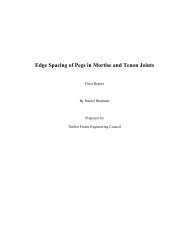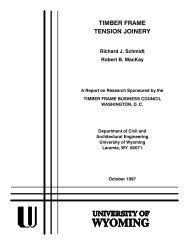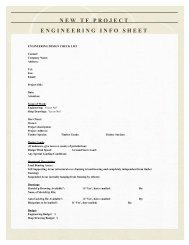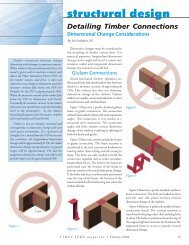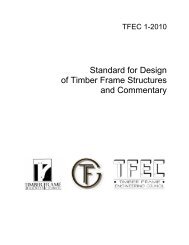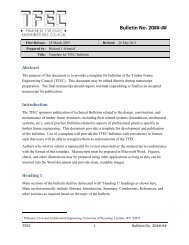Bulletin No. 20##-## - Timber Frame Engineering Council
Bulletin No. 20##-## - Timber Frame Engineering Council
Bulletin No. 20##-## - Timber Frame Engineering Council
Create successful ePaper yourself
Turn your PDF publications into a flip-book with our unique Google optimized e-Paper software.
Heading 1<br />
Main sections of the bulletin shall be delineated with “Heading 1” headings as shown here.<br />
Main sections normally include Abstract, Introduction, Summary, Conclusions, References, and<br />
other sections as required by the topic of the bulletin.<br />
Heading 2<br />
Subsections under main sections shall be delineated with “Heading 2” headings as shown here.<br />
If subsections are used, they must be at least two in number within a main section.<br />
Heading 3<br />
Sub-subsections with subsections shall be delineated with “Heading 3” headings as shown here.<br />
When used, they too must be at least two in number within a subsection. However, they are to<br />
be used sparingly to avoid fragmentation of the text. Section delineations below level 3 are not<br />
permitted.<br />
Style<br />
Prepare the text in 12-point Times New Roman font. To the extent possible, avoid use of the<br />
passive voice. For spelling, punctuation, and capitalization, use Merriam Webster's Collegiate<br />
Dictionary. For words that do not appear in that dictionary, use Webster's Third International<br />
Dictionary. For engineering units, either US Customary units or SI units are acceptable. If one<br />
system of units is given preference, key values should also be presented in the other system of<br />
units. Avoid exact conversion of units for approximate numerical values. For instance, if a<br />
structure contains approximately 10,000 bf of timber, the appropriate SI quantity is 24 m 3 , not<br />
23.597 m 3 .<br />
Do not use the expression “and/or.” For example, when "A and/or B" is truly the case, write "A<br />
or B, or both." Also, do not use a slash (/) as a conjunction or a form of punctuation. Use “and,”<br />
“or,” commas, or semicolons as appropriate.<br />
In general, avoid the use of symbols in text. When stating dimensions, use "by" not x, for<br />
example, "10 by 5 in. (254 by 127 mm)." Show tolerances, for example, as 10 by 5 ± 2 in. (254<br />
by 127 ± 6 mm)." Do not use a hyphen or a dash for the word "to" (e.g. 2 to 4 inches thick)<br />
except in tables where needed to conserve space. Do not use ( ' ) or ( " ) for feet and inches in<br />
text, tables, or figures. For other information on style use Manual of Style, The University of<br />
Chicago Press.<br />
TFEC 2 <strong>Bulletin</strong> <strong>No</strong>. 20XX‐XX



